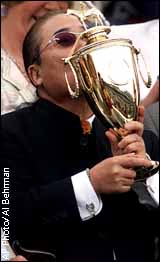| |
Sekiguchi's first Derby a dream come true
By Jim Litke
Associated Press
LOUISVILLE, Ky. -- The American servicemen occupying Japan at the end of World War II used to regale the 10-year-old boy with tales of the Kentucky Derby. On Saturday, Fusao Sekiguchi finally got to see it for himself.
The view from the winner's circle was breathtaking.
"The first time I laid eyes on this horse," Sekiguchi, smiling broadly, said through an interpreter, "I knew he was destined to
be the Derby winner."
|  | | Fusao Sekiguchi clutches his prize for winning the Kentucky Derby. |
Fusaichi Pegasus was all that and more, a big, brown muscular colt whose resounding win in Saturday's race might have been the
clarion call the sport is desperately waiting to hear.
Thoroughbred racing needs stars in the worst way, and the Japanese software magnate who owns him is more than willing to
comply. The final word on whether his horse is fit enough will come from trainer Neil Drysdale, but no one should question his own
desire to run Fusaichi Pegasus in the final two legs of the Triple Crown.
"I love challenges," he said. "We had been told many times that 21 years have passed since the last time a favorite won this
race.
"But we love breaking records," Sekiguchi added. "And we love
setting new ones."
They were not records, but Sekiguchi's way of doing business is
certainly something new in a hidebound industry hemmed in by so
much tradition.
Try to remember the last time an interpreter was needed in the
winner's circle. Pity poor Kentucky Gov. Paul Patton; his stab at
pronouncing Sekiguchi's first name (foo-sa-O) wasn't close. And his
name is hardly the most exotic thing about him.
Sekiguchi believes in vibes, in looking directly into the eyes of each and every yearling he is thinking about buying. Once he
makes up his mind, the money is an afterthought.
Although Kentucky horseman John Ward was representing his interests at the 1998 yearling sales in Keeneland, Sekiguchi turned
up to see a horse identified in the catalogue as "Hip 228" for himself.
"I went to look at him in the barn. I felt an enormous power," he recalled, "and that's when I made up my mind."
That night, Sekiguchi convened his staff in his hotel room. The ponytailed entrepreneur was wearing pajamas, but everybody in the
room understood he was deadly serious.
"I want this horse," he said. "I don't care how much he costs."
Trainer D. Wayne Lukas, who has won four Derbies and bought and trained two horses for Sekiguchi in the past, quickly figured out
who was bidding against his owners at that sale. His blood ran cold. Their nerve ran out at $3.8 million.
"I knew how his mindset was," Lukas said recently. "When I zeroed in on the two horses, I asked him, 'How much is your limit?'
and he said, 'Just buy them.'"
This time, the bidding for Hip 228 stopped at $4 million.
"I would have paid $5 million," he said. "Happily."
That kind of talk will send a shiver down the spines of established horsemen on this side of the Pacific, but it shouldn't.
Sekiguchi loves America, he loves the horse racket, and has ever since since his childhood in Osaka, Japan.
The soldiers and sailors who befriended the little kid with few belongings and no plans were impressed enough several decades later
to provide Sekiguchi with references decades later when he came to the United States to do business.
Horses, apparently, aren't the only commodities at which Sekiguchi tossed money. He was thrown out of one company because
his plans were too grand for the boss' taste. But if Sekiguchi's spending habits are open to questioning, his acumen is not.
His decision to get into racing was more emotional than reasoned -- "I always loved horses, but I knew little about racing" -- but
Sekiguchi put together a top-flight stable in a rush. He began with five horses 18 years ago. Seven years later, he won the Japan
Derby, with Fusaichi Concord. Sekiguchi came up with the first
name, Fusaichi, by combining his own name, Fusao, with the suffix,
"ichi," which means No. 1 or first in Japanese. Pegasus, of
course, is the winged horse of mythology.
Now, Sekiguchi has created a ripple in the biggest racing circle of all.
When he first started out in the thoroughbred business in America, nearly everyone was "skeptical," Sekiguchi recalled.
Some no doubt were put off by his sense of style. In that sense, though, it wasn't much different from back home.
"In Japan, when people hear that I paid $4 million, they thought I was crazy," Sekiguchi said. "But I've always been a
challenger. I like to be on the edge."
And in the winner's circle.
|
| |
